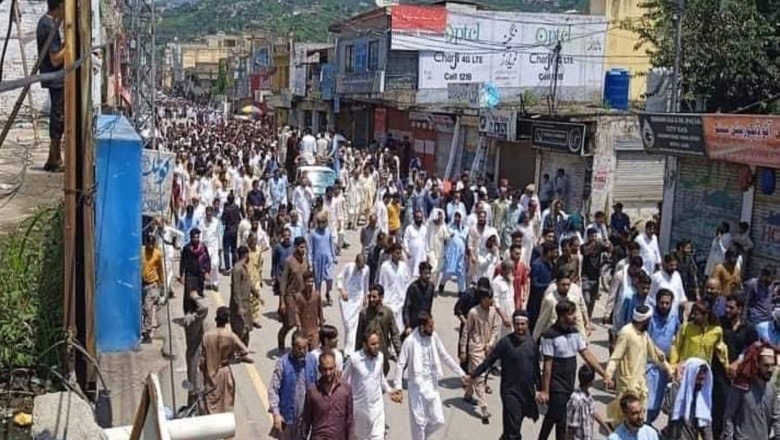
views
13 types of taxes have been imposed on an electricity bill in Pakistan-occupied Jammu and Kashmir (PoJK). However, the most controversial is the fuel (tax) charges added to the electricity bill. In PoJK, we do not produce electricity using any kind of fossil fuel. Our powerhouses are based on hydropower. Pakistan is forcing our people to pay for the fossil fuel that is used in its Punjab province to produce electricity. Not only that, Pakistan is selling us per unit of electricity at an astonishingly higher price than they sell it to their own consumers. Allow me to explain.
On October 22, 1947, 69 days after the partition of India, Pakistan attacked our sovereign state of Jammu and Kashmir with the intention of forcefully annexing this Muslim-majority territory. On October 26, 1947, our king, Maharaja Hari Singh signed an instrument of accession with the last governor-general of India, Lord Mountbatten. This was totally legal as the 1947 India Independence Act gave the kings and the rulers of more than 560 princely states across British India the right to choose which of the two dominions they were willing to join.
Once the accession of the state of Jammu and Kashmir with India was in place, Indian troops were gathered and flown into Srinagar, the then capital of the state of Jammu and Kashmir. On October 27, 1947, the Pakistan Army was beaten and forced to retreat. On August 13, 1948, the terms of a cease-fire were laid out in a United Nations resolution and were later adopted on January 5, 1949. The western parts of Jammu province and the northern parts of the Gilgit agency thus remained under the illegal occupation of Pakistan and remain so, till this day.
The August 13, 1948, UN resolution required Pakistan to withdraw its armed forces and any non-resident militias they had brought along to fight Maharaja Hari Singh and capture our state. To this day, our lands remain in the custody of the Pakistan Army. The subsequent civil governments that come into power in Pakistan are reliant on the military due to the latter’s deep roots and encroachment in all sections of political, economic and social strata.
Two Pakistani prime ministers, who stepped out of line, were hanged and killed by the military regimes while a third, Imran Khan, languishes in a prison cell and more than 200 cases have been trumped up against him. Pakistan has looted our riches and plundered our natural resources including rivers, minerals and forest wood.
It is estimated that PoJK has Rs 78.59 trillion worth of minerals including precious stones, gold, lithium, gypsum, lime and much more. Yet, out of a total population of four million, more than two million of our people are working in low-paid jobs across the Middle East, Europe and West Asia. 700,000 of our youth are unemployed.
All rivers that stream into Pakistan flow from PoJK and Occupied Gilgit-Baltistan. During the 1960s, our most fertile land which was world famous for its rice paddies was requisitioned by Pakistan to make way for the construction of a dam and a hydropower plant. Hundreds of centuries-old villages were submerged including my ancestral village of Ladaran. Thousands were displaced. At the time, the military dictator General Ayub Khan promised us that our requirement of 300 megawatts would be delivered to us free of charge before any electricity is sent to the national grid of Pakistan. However, once it was complete and was producing 1400 megawatts of electricity, Pakistan stole it all. Not only that, Pakistan charged us even more per unit of electricity than its own people.
On August 10 this year, the federal minister for water resources Khurshid Shah inaugurated the Neelum-Jhelum hydropower project in PoJK. At the ceremony, the minister announced that the project will produce a total of 969 megawatts and that it will all be added to the national grid of Pakistan. This has infuriated the oppressed people of PoJK. Pakistan pays us five rupees per unit for each unit it buys from us and then sells it back to us at up to a whopping Rs 53 per unit. Now on top of that, Pakistan has imposed fuel added charges and all the rest, which have skyrocketed the monthly electricity bills.
On August 22, a PoJK-wide civil disobedience movement kicked off. In every village, town and city, consumers held their electricity bills and burned them. Rs 40 million worth of electricity bills were burned in the town of Harjira alone. There are two unique points about the current wave of protests that have engulfed PoJK.
Firstly, it is being led by work-based and civil society organisations such as Jammu Kashmir pensioners associations, the traders associations, Awami (people’s) Action Committees composed of civil society, human and social rights activists and so on. Secondly, the current protest movement is totally devoid of a political agenda. Its demand is based purely on one point: cancellation of recently added taxes on electricity bills.
Political parties have been caught unprepared and by surprise by the public outburst. They have never been able to lead a mass movement in PoJK since the stranglehold of the Pakistan military is such that any dissident is made to disappear from the scene. However, unless the current or any future social unrest, which stems from economic injustice, is linked with the political agenda of gaining independence from Pakistan, all civil unrest would only lead us into an abyss of frustration and hopelessness.
Dr Amjad Ayub Mirza is an author and a human rights activist from Mirpur in PoJK. He currently lives in exile in the UK. Views expressed in the above piece are personal and solely that of the author. They do not necessarily reflect News18’s views.



















Comments
0 comment